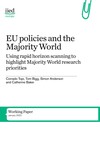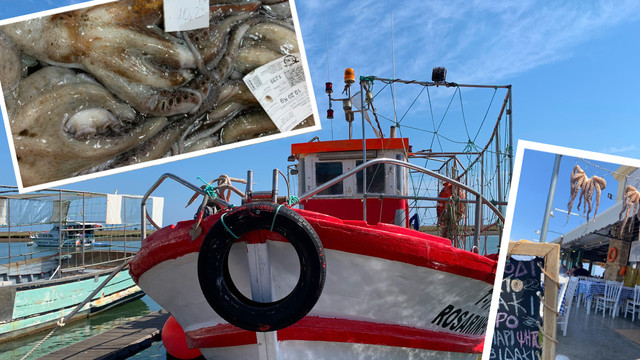Innovative tracker engages Majority World experts to identify gaps in European research priorities
We summarise the results of an ambitious ‘horizon scanning’ project looking at how European research and policy can better reflect environmental and socio-economic development needs in Majority World countries in Asia, Africa and Latin America, and invite partners to engage in the project’s next iteration.


Participants at the ETTC session reflect on how horizon scanning and living labs can improve the impact of European research and policy on global developments (Photo: copyright Stephan Röhl/Think Tank Lab)
The European Union (EU) is considered a leader in promoting sustainable development at a global scale. Its policies and interventions are critical to achieving the 2030 Agenda for Sustainable Development and have huge impacts on Majority World countries in Asia, Africa and Latin America.
Research plays a key role in the development of these policies by identifying the priorities and issues that need to be addressed. But too often European policymaking and research setting fail to include the perspectives of those most affected by environmental and development policy: stakeholders from the Majority World.
Consider, for example, the Carbon Border Adjustment Mechanism (CBAM): while its intention is commendable, its adverse impacts for Majority World countries in Africa and Asia, whose economies rely heavily on the production and export of goods to the EU, are now becoming clearer.
In 2022, IIED Europe carried out an ambitious horizon scanning exercise to identify priorities for research on how EU policies, institutions and citizens affect the Majority World. Stakeholders from the global South and North were invited to identify areas for research on EU policymaking and its impacts in Asia, Africa and Latin America.
The horizon scanning exercise aimed to identify priority policy-relevant research questions for researchers and policymakers and to give Southern voices a say in future research and, thereby, policy.
The exercise highlighted gaps between current EU research and the real needs of actors in the Majority World, and identifies new research priorities that can better support policy and decision-making, particularly climate change, economics, just transition and natural resources.
This was the first comprehensive mapping of Majority World expert opinions on knowledge gaps and research questions on EU impacts that has been collected and made publicly available to researchers, funders and other actors in the sustainable development community.
An innovative approach to reassessing research priorities
The main outcome of this exercise was the development of a searchable open-access database – the IIED Europe Global Research Priority Tracker – that presents which priorities EU sustainable development policies, research and funding should focus on in the future. These priorities were identified by experts largely from the Majority World in the form of research questions. In addition to this tracker, we produced a working paper describing the study’s aims and methodology, and presenting its findings.
While most questions focused on climate change, economics, just transition, and natural resources (see the horizon scanning examples box below), some questions did not fall under any of the clusters, so we categorised them as 'other themes'. These may offer insights into issues that are still under the radar of the EU’s policy discussions.
Surprisingly, the participants did not refer to issues such as pandemics or security. Topics that have dominated EU discussions in recent years, such as the blue economy and fisheries, were also mostly absent. This may be due to the background and expertise of participants, but may also highlight the mismatch between priorities set by European actors and the actual needs of stakeholders from the Majority World.
The tracker and its findings offer a snapshot in time of priorities identified by experts from the Majority World. But since policies and their impacts are dynamic, we plan to repeat this exercise every two years.
To complement the tracker, we will establish IIED Europe’s multi-stakeholder living lab – a physical and virtual hub – to analyse in more detail some of the questions and issues identified in the tracker. The living lab will be framed within a set of participatory rules that will ensure equal power and representativity, and its scope, objectives and governance will be co-designed by the participants.
Then we aim to co-develop with the living lab participants innovative policy concepts and solutions to address some of those issues. The living lab will also capture emerging issues in European policy that may be relevant and have an impact on global environmental and socio-economic development, in between iterations of the horizon scanning exercise.
Its flexibility will allow it to adapt to unforeseen developments and unintended consequences of national, European and international policies, identifying possible solutions at an early stage. An initial scoping and design phase will help us reflect on and identify the key features of the living lab to ensure that it is fit for purpose.
Challenging conventional approaches
We need to progress from conventional approaches, where European researchers and funders set the agenda, to one that brings together a much broader group of experts to decide together what research is needed to help maximise benefits and minimise adverse impacts of European policymaking processes on environmental and socio-economic development globally.
The initiative is a unique opportunity for researchers, funders and policymakers working at the interface between Europe and the Majority World to reflect on and challenge their priority setting and research commissioning processes.
By listening to experts in the Majority World, European actors can align their priorities with Majority World agendas, ensuring that their policies and programmes have a more positive impact on global development.
Looking ahead: can you get involved?
Over the last year, we have promoted and disseminated this exercise and its findings, as well as engaged with and learned from potential users. For example, we contributed to other horizon scanning exercises (Future Earth and UNEP) and participated in the European Think Tank Conference 2023 (ETTC), where we hosted the session 'Understanding European impacts on global developments: horizon scanning and living labs'.
Now we are planning a second iteration of the horizon scanning exercise, which will include the IIED Europe Global Research Priority Tracker and the multi-stakeholder living lab. We aim to establish and convene a coalition of partners that can help us design and deliver the next phase to maximise its impact.
This time, Majority World experts will be involved in its scoping and design, as well as in its governance and oversight.
Can you help us shape this game-changing process? Are you interested in using the approach and its findings to inform your policy or research priorities? Can you mobilise your networks of experts from the Majority World to contribute? If so, we want to hear from you.




